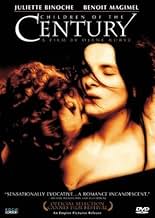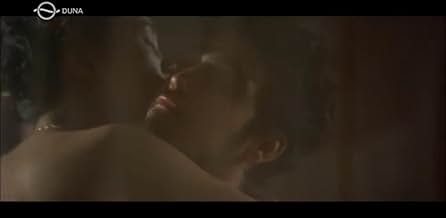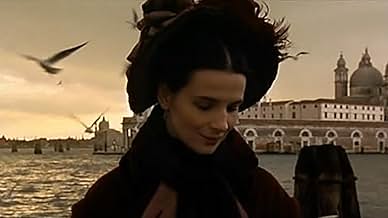AVALIAÇÃO DA IMDb
6,5/10
2,1 mil
SUA AVALIAÇÃO
Adicionar um enredo no seu idiomaA story of doomed passion between two genius writers of the 19th century - novelist George Sand and poet Alfred de Musset.A story of doomed passion between two genius writers of the 19th century - novelist George Sand and poet Alfred de Musset.A story of doomed passion between two genius writers of the 19th century - novelist George Sand and poet Alfred de Musset.
Victoire Thivisol
- Solange
- (as Victoire)
- Direção
- Roteiristas
- Elenco e equipe completos
- Produção, bilheteria e muito mais no IMDbPro
Enredo
Você sabia?
- CuriosidadesGeorge Sand's estate loaned the production some of Sand's jewelry, including a sapphire ring, which Juliette Binoche wears throughout the film.
- Citações
George Sand: Love does exist, it's not an illusion. One merely has to recognise it, and be humble before it.
- Versões alternativasThe original French theatrical version, which runs at 135 mins begins as Sand plans to leave her husband and Musset's father dies. This version continues after their final meeting as Sand begins to write her story and attempts in vain to see Musset one last time. This version ends with a direct to camera address by Sand at Musset's tomb. A shorter theatrical version was released in Germany, Spain, UK and US which begins with Sand reading from "Lélia" and ends with Sand and Musset's final meeting. It runs at 105 mins. This version contains two new scenes: Sand and Musset being introduced to each other and a dance sequence. However the opening sequences featuring Sands arrival in Paris during an uprising and her relationship with Marie Dorval are lost, as are the closing scenes as she attempts to see Musset a final time. Most DVD releases have favored the Original 135 min version which was more critically popular.
- ConexõesVersion of À Noite Sonhamos (1945)
Avaliação em destaque
"Enfants du siècle" does'nt really mean "Children of the Century", as for the contemporaries it was obvious that it meant "Heirs of the Napoleonic Saga".
This generation, Hugo, Dumas,, Musset, Nerval, Lamartine and Vigny was obsessed by the sad perception that they could not lead the heroïc, larger than life existence experienced by their fathers during the Revolution and Empire - a period (or shortly thereafter) during which they were born. They - and Aurore Dupin de Francueil (aka George Sand) with them - sought vicariously to find fame and glory in literature, particularly in theatre which was the « 7th art » of those days, and in forms of "original living" which would not surprise those reading now on the antics of 'world famous' people. In those days, that was called « Romantism ».
All of them succeeded in literature; but - even though in those days novels, essays, tales, and poems were keenly read - theatre was the big thing: a kind of Hollywood on Seine! And the successful theatre writers and performers had a fame akin to that of our Hollywood stars of today.
So this film should be seen as the biopic of two larger than life "Hollywood stars".
No surprise that passions, drugs, unfaithfulnesses and manifestations of an enormous ego are sprinkled liberally in this film. One may think of the Burton and Taylor duet, but with a wittier and more intellectual bent.
Musset, fabulously talented, has left immortal poems and several theatre pieces which have been rediscovered in the XXth century and which will last; but he has sadly wasted his talent in alcohol (absinthe mainly), drugs and philandering, prostitutes included; he died at 47.
Sand has been the more resilient of the two. She died at 71, a busy grandmother fond of country life, a true precursor of the cause of women's freedom in terms of choosing her (sometimes Saphic) lovers, espousing political causes, and communing with nature.
Sand's "original" life is her real masterpiece; it has a very modern tone. Her writings are numerous and charming, but for me, the literary genius of the two is Musset: most of his writings are masterpieces, even though his life has been a shambles.
It is no surprise then that Diane Kurys takes Sand as her lead character, against a despondent and weak Musset. And I quite understand why - to some reviewers - they both appear boorish, selfish and inspiring few sympathy. But - keeping in mind that Musset and Sand ooze talent and are their generation's Hollywood superstars - you may enjoy this well crafted biopic.
___ .
This generation, Hugo, Dumas,, Musset, Nerval, Lamartine and Vigny was obsessed by the sad perception that they could not lead the heroïc, larger than life existence experienced by their fathers during the Revolution and Empire - a period (or shortly thereafter) during which they were born. They - and Aurore Dupin de Francueil (aka George Sand) with them - sought vicariously to find fame and glory in literature, particularly in theatre which was the « 7th art » of those days, and in forms of "original living" which would not surprise those reading now on the antics of 'world famous' people. In those days, that was called « Romantism ».
All of them succeeded in literature; but - even though in those days novels, essays, tales, and poems were keenly read - theatre was the big thing: a kind of Hollywood on Seine! And the successful theatre writers and performers had a fame akin to that of our Hollywood stars of today.
So this film should be seen as the biopic of two larger than life "Hollywood stars".
No surprise that passions, drugs, unfaithfulnesses and manifestations of an enormous ego are sprinkled liberally in this film. One may think of the Burton and Taylor duet, but with a wittier and more intellectual bent.
Musset, fabulously talented, has left immortal poems and several theatre pieces which have been rediscovered in the XXth century and which will last; but he has sadly wasted his talent in alcohol (absinthe mainly), drugs and philandering, prostitutes included; he died at 47.
Sand has been the more resilient of the two. She died at 71, a busy grandmother fond of country life, a true precursor of the cause of women's freedom in terms of choosing her (sometimes Saphic) lovers, espousing political causes, and communing with nature.
Sand's "original" life is her real masterpiece; it has a very modern tone. Her writings are numerous and charming, but for me, the literary genius of the two is Musset: most of his writings are masterpieces, even though his life has been a shambles.
It is no surprise then that Diane Kurys takes Sand as her lead character, against a despondent and weak Musset. And I quite understand why - to some reviewers - they both appear boorish, selfish and inspiring few sympathy. But - keeping in mind that Musset and Sand ooze talent and are their generation's Hollywood superstars - you may enjoy this well crafted biopic.
___ .
- christian_fournier
- 28 de nov. de 2021
- Link permanente
Principais escolhas
Faça login para avaliar e ver a lista de recomendações personalizadas
- How long is Children of the Century?Fornecido pela Alexa
Detalhes
- Data de lançamento
- País de origem
- Central de atendimento oficial
- Idioma
- Também conhecido como
- Children of the Century
- Locações de filme
- Empresas de produção
- Consulte mais créditos da empresa na IMDbPro
Bilheteria
- Faturamento bruto nos EUA e Canadá
- US$ 56.611
- Fim de semana de estreia nos EUA e Canadá
- US$ 8.044
- 15 de set. de 2002
- Faturamento bruto mundial
- US$ 381.624
- Tempo de duração2 horas 15 minutos
- Cor
- Mixagem de som
- Proporção
- 2.35 : 1
Contribua para esta página
Sugerir uma alteração ou adicionar conteúdo ausente

Principal brecha
By what name was Os Filhos do Século (1999) officially released in India in English?
Responda































